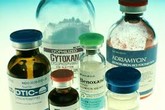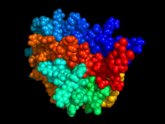Biosimilars
Positive phase III results for rituximab biosimilar ABP 798
Biotech giant Amgen, and its partner Allergan, announced on 24 January 2019 positive data from a phase I/III study of its rituximab biosimilar (ABP 798) compared to Rituxan (rituximab).
Pfizer drops five preclinical biosimilar programmes
US pharma giant Pfizer confirmed on 15 January 2019 that it had terminated five of its preclinical biosimilar programmes after looking at the results of the company’s annual investment review.
Questions over DANBIO relevance for non-medical switching
Italian rheumatologists Fabrizio Cantini and Maurizio Benucci commented on the paper from Glintborg and co-authors ‘To switch or not to switch’, which reported the results of biosimilar etanercept switching in Denmark [1].
EC approval for pegfilgrastim biosimilar Fulphila
In January 2019, the pegfilgrastim biosimilar, Fulphila, received European Commission (EC) approval.
Biosimilar teriparatide approved for the treatment of osteoporosis
Osteoporosis is a modern day epidemic longevity has brought about and represents an enormous socioeconomic burden. Being largely asymptomatic the silent thief can get away with insidiously stealing the patient’s bones until, as a result of the relentless bone loss, fragility fractures inevitably occur. The first, so-called sentinel fracture is the forerunner of the devastating fracture cascade as any prior fracture translates into a two- to four-fold increase in the risk of sustaining a subsequent one within one year [1].
Three FDA approvals for Glenmark as it enters US branded dermatology market
Glenmark Pharmaceuticals Inc has been granted approval by the US Food and Drug Administration (FDA) for its generic versions of Zytiga, DermOtic oil and Qudexy XR, and has announced its entry into the US branded dermatology segment.
Safety surveillance of bevacizumab biosimilar (Bevax) in Argentina
Benefit-risk evaluations are mandatory throughout the life cycle of a therapeutic agent, to guarantee efficacy for the authorized indications without an unacceptable incidence of adverse effects. This monitoring can be carried out using pharmacovigilance (PhV) procedures, which are vital in the identification and prevention of adverse drug reactions (ADRs). Due to the inherent variability of bioproduction, this is of paramount importance for biological products, including biosimilars.
PanGen gains Malaysian approval for epoetin alfa biosimilar
South Korea-based biotechnology company PanGen Biotech (PanGen) announced on 7 February 2019 that Malaysia’s National Pharmaceutical Regulatory Agency has granted sales approval for Erisa, an epoetin alfa biosimilar.
European regulatory framework for approval of biosimilars – perspectives and future developments
Regulatory agencies around the world have reviewed and approved marketing authorization applications for biosimilars via specific marketing authorization procedures that vary between jurisdictions. In Europe, the European Medicines Agency (EMA) has already more than 10 years of experience with review of applications and approval of biosimilars for use in the European Union.
Long-term stability of trastuzumab biosimilar under various storage conditions
Trastuzumab (TTZ) is a monoclonal antibody that interferes with the human epidermal growth factor receptor 2 (HER2). In some cancers, including certain types of breast cancers and gastric cancers, HER2 is overexpressed, causing cancer cells to reproduce uncontrollably. TTZ can be used in the management of these cancers.













